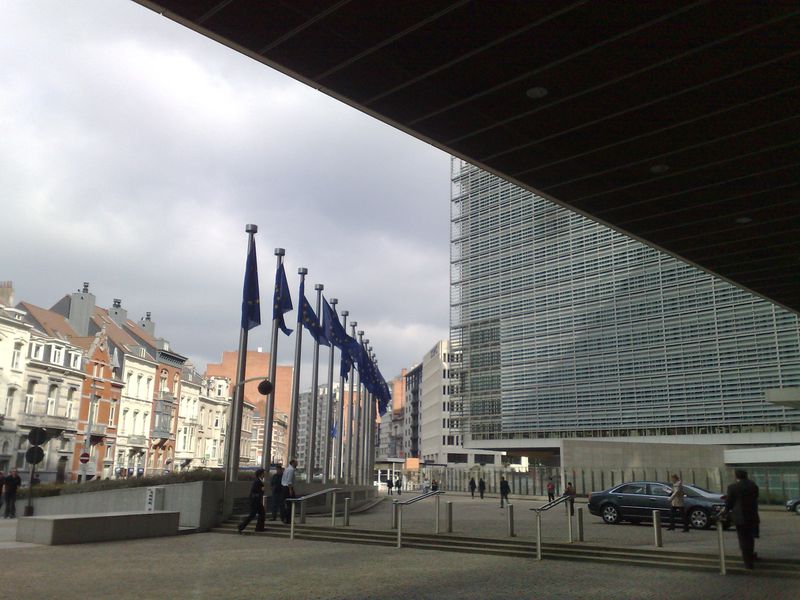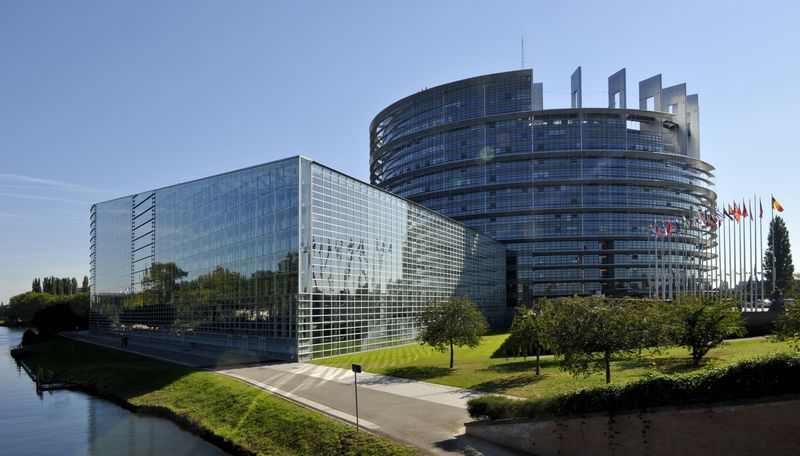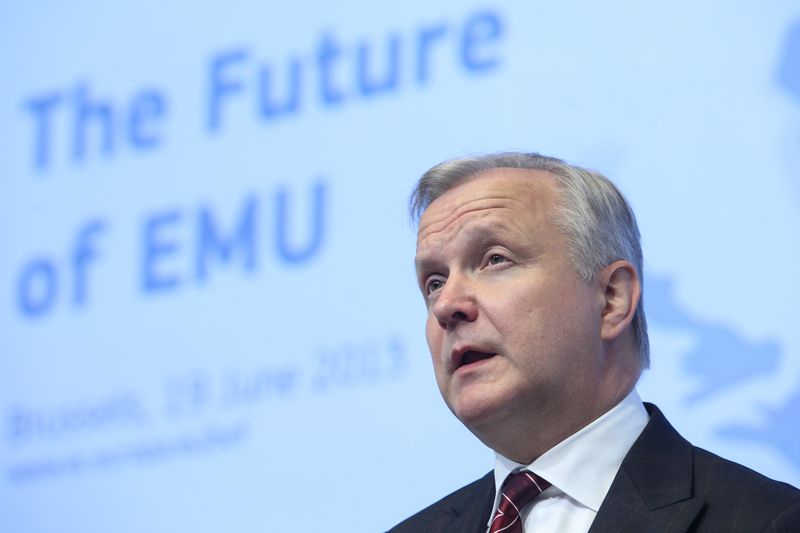Politicisation of the European Commission Is a Problem
Adelina Marini, August 5, 2013
 The European Commission is often called in textbooks and information leaflets a 'government of the EU'. This definition until the beginning of the eurozone crisis was not only not true, but had no chances of starting to come closer to the truth. Ever since the crisis has started, however, the Commission's role has increased significantly. And this is precisely the problem, according to Charles Grant, director of the British pro-European think-tank Centre for European Reform. The paradox lies in its functions because it is neither popular among the governments nor among the voters. 20 years ago, the Commission was viewed as a body that sets the EU agenda and leads in crisis management.
The European Commission is often called in textbooks and information leaflets a 'government of the EU'. This definition until the beginning of the eurozone crisis was not only not true, but had no chances of starting to come closer to the truth. Ever since the crisis has started, however, the Commission's role has increased significantly. And this is precisely the problem, according to Charles Grant, director of the British pro-European think-tank Centre for European Reform. The paradox lies in its functions because it is neither popular among the governments nor among the voters. 20 years ago, the Commission was viewed as a body that sets the EU agenda and leads in crisis management.
And it was the eurocrisis that had led to the Commission gaining unprecedented power. It now monitors national economic policies, issues recommendations, warnings and punishments. Moreover, the Commission is trying to concentrate even more power fighting to have the leading word in the banking union, too, as it has become clear from its proposal on establishment of a single resolution mechanism for ailing banks. And in the past year, the Commission, led a second term now by the former prime minster of Portugal, Jose Manuel Barroso, is hyper active in proposing even deeper integration in the eurozone.
Charles Grant recalls that national governments are those who provide the money to bail countries in trouble out and that is why they set the conditions of the rescue programmes, while the Commission should leave high politics to the European Council, which often means in the hands of several key governments. Many European capitals blame the Commission that it does not prioritise well, that it implements new initiatives too slowly or that it does not focus sufficiently on the repairs of the eurozone. Criticisms which are to a large extent not justified because it is the governments that do not implement many of the agreed by them decisions. Moreover, politicians who criticise the Commission for not coming up with reasonable solutions to the euro area problems are usually the same who get irritated when it proposes a big idea, like the eurobonds, for instance, the analyst writes.
According to him, the Commission role is additionally troubled by the significantly increased influence of the European Parliament over European politics. The Parliament currently has much bigger influence over the second Commission of Barroso than it had over his first term, because the Lisbon Treaty gives Strasbourg much more power. Lobbyists and non-governmental organisations can easily approach MEPs and secure their support for projects for new rules. As a result, the Parliament exercises pressure over the commissioners to come up with new directives. Commissioners, for their part, avoid  annoying the MEPs who can create too much trouble. And this can easily be seen in every appearance of Commission chief Barroso or his commissioner for a hearing in committees or the plenary.
annoying the MEPs who can create too much trouble. And this can easily be seen in every appearance of Commission chief Barroso or his commissioner for a hearing in committees or the plenary.
There is no statement by a commissioner or even by Jose Manuel Barroso himself that can pass in the European Parliament without underlining the exceptional role of the MEPs and without promising them they will have a say. The Parliament fought hard for this role and especially under the leadership of German Socialist Martin Schulz the Europarliament has turned into a very powerful institution at the European level. This was quite evident when the Parliament criticised Barroso for affording too much initiatives instead of striving for the implementation of the already agreed.
But in the same time, the director of the Centre for European Reform is of the opinion that the problem is not as much that the Europarliament has become too powerful, but that the Commission has come too close to it instead to the Council on many issues on the EU agenda. The Commission should report to both bodies - the Council and the Parliament. It should be independent, too. That is why, the analyst believes its politicisation is a problem, because there is a certain contradiction in its role. On the one hand, this is a political body that initiates legislation and mediates for the achievement of compromises among the member states. It is also a technical body that 'polices', in Mr Grant's words, markets and rules, and negotiates on behalf of the member states.
However, the eurocrisis has created an even bigger paradox, the analyst believes and quotes France as an example. When the Commission announced that France can get a two-year extension to bring its budget deficit down to the limit of 3% of the gross domestic product, was this the result of an objective economic analysis or does it reflect the change of the political climate in the national capitals, Charles Grant asks. He believes that politicisation can also lead to favouring of certain political parties. Some socialists, in Grant's words, claim that the Commission was too indulgent to Hungary's PM Viktor Orban, accused of stifling political pluralism in Hungary. A justification for the suspicions of some  Socialists gives the fact that Orban's party is a member of the family of the European People's Party which is dominating the Commission.
Socialists gives the fact that Orban's party is a member of the family of the European People's Party which is dominating the Commission.
And although the analyst does not mention Bulgaria, the lack of a written report under the Cooperation and Verification Mechanism in the beginning of the year and also the much softer reports in the past years also suggest of a politicisation of the Commission and of favouring in political terms. Especially taking into account the heavy criticism the socialist government of Victor Ponta in Romania got. The country report published in the beginning of the year was devastating and unprecedentedly edifying. Charles Grant forecasts that the next elections for the European Parliament in May will accelerate politicisation even more. The Lisbon Treaty envisages the European political parties to propose their own nominations for the position of a Commission president. They will insist after the elections the European Council to propose for the position the nominee of the party with the highest number of MEPs. If the Council proposed another name, it is very likely the MEPs would reject it.
This could increase the interest in the European elections, but is not certain at all that the political parties and the European Council will play this game, because if the Parliament is allowed to nominate Barroso's successor, the Commission will become even more subordinate to the Parliament, which can make the Commission completely dependent on the political majority in Strasbourg. Such a development can be quite worrying, the analyst believes, because the EU needs a strong and independent Commission that is capable of taking into account the common European interest, to focus governments' attention to long-term trends, to propose solutions to immediate problems, to work for the deepening of the single market and to implement without bias its supervisory role over the euro area.
 In other words, it is necessary the Commission to be technocratic especially at a time when the idea of technocratic governments is at its peak after the experience with Italy and Greece. But for that to happen, Mr Charles Grant proposes nothing more than an ordinary agreement among the heads of state with which they should decide to enhance the Commission independence by designating strong figures for commissioners, but also by choosing a strong figure to head the Commission. Currently, the analyst writes, most of the commissioners are mute letters while Barroso is dominating in the college. Given that the commissioners are 28 - one for each member state - Barroso has no option but apply the policy of firm hand.
In other words, it is necessary the Commission to be technocratic especially at a time when the idea of technocratic governments is at its peak after the experience with Italy and Greece. But for that to happen, Mr Charles Grant proposes nothing more than an ordinary agreement among the heads of state with which they should decide to enhance the Commission independence by designating strong figures for commissioners, but also by choosing a strong figure to head the Commission. Currently, the analyst writes, most of the commissioners are mute letters while Barroso is dominating in the college. Given that the commissioners are 28 - one for each member state - Barroso has no option but apply the policy of firm hand.
The member states should also give a mandate to the new president and his/her team to defend their independence in the European Parliament and to support them in their efforts. After the elections next year, the Parliament, Commission and Council should reach a trilateral agreement for the agenda in the EU, the analyst recommends. The problem with the number of commissioners should also be tackled because they are too many and there is no work for all of them. Besides, having a commissioner from each member state stimulates governments and commissioners alike to violate the main rule in the treaties - not represent the member states, but the European interests. Charles Grant proposes the commissioners to be divided into seniors and juniors. The senior commissioners to become vice presidents and the rest - junior commissioners. Practically, the situation at the moment is similar and is best seen in the figure of Olli Rehn, whose position was further enhanced - from an ordinary vice  president he turned into a very strong figure in the Commission and is now responsible specifically for the eurozone, too. This was a safeguard move by Barroso when word was spread about the establishment of a eurozone finance minister.
president he turned into a very strong figure in the Commission and is now responsible specifically for the eurozone, too. This was a safeguard move by Barroso when word was spread about the establishment of a eurozone finance minister.
Charles Grant steps on a very serious mine by pointing out that when it comes to treaty changes it should be enshrined that the big member states should always have a commissioner, although not by all means a vice president, while the smaller countries will take turns. This is an idea which will hardly be accepted cordially by the smaller countries, but they could agree on common nominations. Another change to the treaties the analyst proposes is to give the European Council the power to fire the Commission. At the moment, the Parliament has such a right and by only threatening to use it forced the Jacque Santer Commission to resign in 1999. And if in the treaties it is explicitly enshrined that the two institutions can fire it this will equally distance the Commission from the MEPs and the governments.
 Federica Mogherini | © Council of the EU
Federica Mogherini | © Council of the EU | © Council of the EU
| © Council of the EU Luis De Guindos | © Council of the EU
Luis De Guindos | © Council of the EU